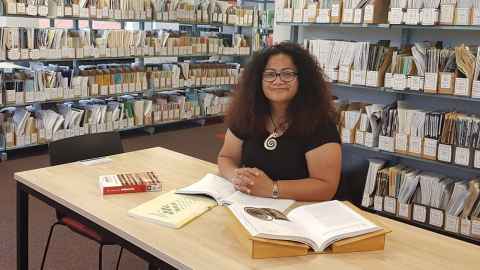Riripeti Haretuku – Doctor of Education
Riripeti Haretuku enrolled in the Doctor of Education to improve her research skills and help whānau by becoming an effective Maōri health advocate in research and academic settings.

“I started working in the area of Māori cot death prevention, also known as sudden and unexpected infant death syndrome (SIDS) prevention in around 1992. SIDS now sits under the broader term, (SUDI), the sudden unexplained death of an infant (SUDI) with other associated infant deaths. Over time and with the support of Māori SIDS advocates, I have become more involved in various aspects of Māori public health and education.
“My decision to complete a Doctor of Education was motivated by the dominance of a professional SUDI discourse, and the absence of a whānau Māori narrative which goes beyond the promotion of risk factors.
“I intend to rethink SUDI within a kaupapa Māori framework. I use the term mate ohorere pēpi in this thesis, not as an equivalent of SUDI, but to encompass all the aspects of a Māori experience of sudden death – in this case, a pēpi (baby). This means that any discussion of mate ohorere pēpi must include Māori understandings of colonisation, religion, death and the Māori spiritual world, the tangihanga, beliefs about the tūpāpaku.
“The Doctor of Education has made me stop and reflect on the work done to prevent Māori SIDS and I can add the lessons I have learned to the whānau narrative. I confess that the writing has been challenging but my vocabulary and research skills have increased, and I have developed new academic language skills which promote a contemporary Māori narrative in Māori health research today.
“I balance my research with my role at Mauriora Associates, an organisation which aims to reduce Māori health disparities by providing workshops on the relevance of Te Tiriti o Waitangi and cultural competency in healthcare. I appreciate the opportunities I have to work in and for the Māori community. Sometimes I think it would be nice to be less busy, but after thirty years, I know too much not to do more.
“I’m looking forward to completing my thesis and discussing my findings. I feel that the Doctor of Education has helped me to be better equipped in an academic setting to advocate for whānau more effectively.”